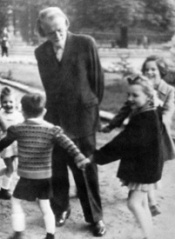 Zoltán Kodály (1882-1967) was a Hungarian teacher, composer, and philosopher who believed that music could be taught using the folk repertoire of a culture. He traveled with Belá Bartok around Hungary in the early 1900s to collect folk songs. After his travels, Kodály gathered other teachers to help him develop his philosophy of music education based on universal music literacy.
Zoltán Kodály (1882-1967) was a Hungarian teacher, composer, and philosopher who believed that music could be taught using the folk repertoire of a culture. He traveled with Belá Bartok around Hungary in the early 1900s to collect folk songs. After his travels, Kodály gathered other teachers to help him develop his philosophy of music education based on universal music literacy.
Singing is “the essence” of the concept. The voice is a universal instrument, free and accessible to all. Kodály said, “If we ourselves sing often, this provides a deep experience of happiness in music. Through our own musical activities, we learn to know the pulsation, rhythm, and shape of melody. The enjoyment given encourages the study of instruments and the listening to other pieces as well.”
Experiencing music cannot begin too early. Children first connect musically through the voices of their parents. Once, when Kodály was asked when music education should begin, he replied, “Nine months before the birth of the mother.”
Traditional folk music provides the best and most natural material for becoming a literate musician. The traditional folk music of the language spoken at home provides the source for basic elements of music literacy. After the understanding of our own traditional music, we can study other culture’s music and connect all styles to composed music.
Music literacy is like language literacy. Kodály once said, “we should read music in the same way that an educated adult will read a book: in silence, but imagining the sound.” He believed that musical literacy is the right of every human being.
Using a sequential approach. Kodály-inspired teachers develop a sequential curriculum based on the culture and age of the student. We teach easier melodic and rhythmic concepts first to build their musical knowledge. We emphasis the experience of music before introducing notation and terminology.
Quality music is the best material for teaching. Kodály believed that only the best music should be used. He said, “Let us take our children seriously! Everything else follows from this.. only the best is good enough for children.”
For more information about Kodály and his philosophy, visit Holy Names University’s American Folk Song Collection.
Note: Thank you to TRIKE and NCAKE for much of the information on this page.

